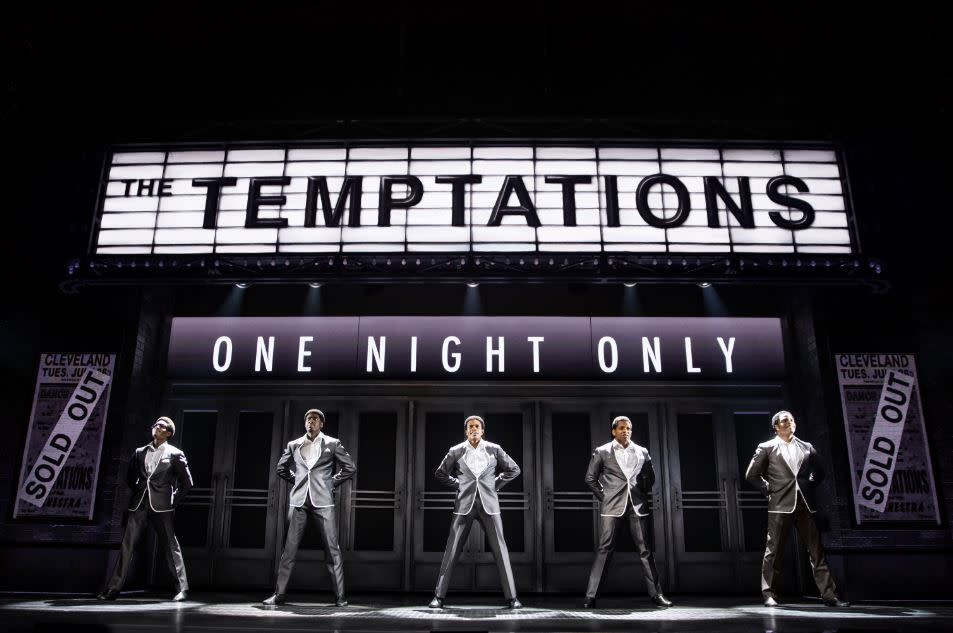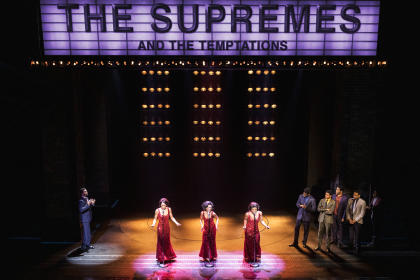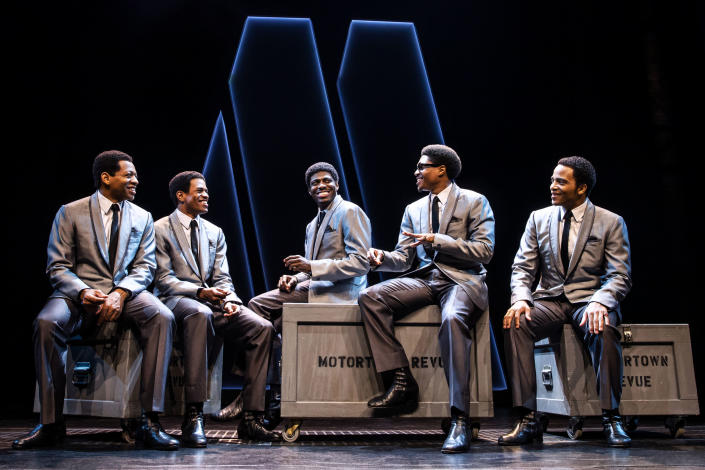‘Ain’t Too Proud’ Broadway Review: The Temptations, Saved By Song

Ain’t Too Proud – The Life and Times of The Temptations is further proof, as if we need it, that the term “jukebox musical” just isn’t fair – to jukeboxes. Feed a juke some cash and it delivers music, free of the blunt exposition that passes for librettos in so many of these stage biographies. Even with source material as glorious as “My Girl,” “Just My Imagination,” “Papa Was A Rolling Stone” and the song that gives this production its title, the result feels less celebratory than ruthlessly efficient, like the treadmill device that’s forever moving the ever-changing Temptations line-up on, off and around the Imperial Theatre’s stage.
Opening tonight, Ain’t Too Proud mostly accomplishes what so many of the lesser examples of this genre haven’t – a fine cast performs beloved songs, performs them well enough to conjure and honor the people they’re playing and the songs they’re singing, and adds enough Broadway dazzle to give the production an edge – a slight edge, but an edge – over the in-name-only descendant bands you might catch playing at your local amphitheater this summer.
Related stories
'Gary: A Sequel To Titus Andronicus' Sets New Opening Date
'Frozen' Marks Broadway Anniversary With News Of International Expansion
James Corden To Host 2019 Tony Awards
In that respect, Ain’t Too Proud, with Robert Brill’s minimalist onstage/backstage sets, Paul Tazewell’s appealing, era-accurate costumes and a really fine cast as the classic and subsequent iterations of the great Motown group easily outdoes such recent genre cousins as The Cher Show and Summer: The Donna Summer Musical. For starters, The Temptations’ song trove is infinitely better than the likes of “Gypsies, Tramps and Thieves” or “MacArthur Park,” and Ain’t Too Proud even (and unnecessarily) pads its roster by mining the larger Motown catalogue for songs not typically associated with the guys onstage (“For Once in My Life,” “War,” “If You Don’t Know Me By Now”).
Surely such extra-catalogue pillaging goes against the stringent Equity-and-League approved code of Jukebox rules and regulations, just as surely as no such code exists and just as surely as it seems it must, so exactingly formulaic have these shows become. Ain’t Too Proud most obviously adopts and simplifies the Jersey Boys playbook, slimming the shifting-narrator format down to one: Baskin’s Otis Williams, The Temptations’ founder, guiding light, party whip and – no small benefit here – not-dead survivor conducting the between-song Ted Talk history. Ain’t Too Proud is based on Williams’ memoir, a fact you won’t need a Playbill to discern. I’ve no reason to doubt he was the only Temptation to resist a group freebase, but the humblebrags do start to stack up well before the curtain falls on this last-man-standing history.
But what a history it is, a culture-shaking career graced with heavenly voices and glorious music that worked its way deep into the soul of an era. Ain’t Too Proud lets it all glide by far too quickly, or rather too smoothly – the story wears out before its two hours and 30 minutes are up without any one moment feeling weightier than another. Dominique Morisseau’s book hits each biographical beat with all the finesse of a Wikipedia entry.

The Temptations story, more memorably explored in a 1998 NBC miniseries, is an unfortunately familiar one in pop music: rags to riches, partying to addiction, infighting, management rip-offs, domestic lives undone by infidelity, the road and ego. The fly-over perspective that is the jukebox genre’s default mode does a story like this no good, especially when it’s been done before and better (again, Jersey Boys).
Not that Ain’t Too Proud ignores or prettifies the unsavory aspects of its characters (for that, see Summer). David Ruffin in particular gets his well-deserved lambasting, his violent misogyny on display at least in bits and pieces. The man whose voice turned “My Girl” into one of the most stunning pop hits of the century was also, by most accounts, a woman-beating monster, and Ain’t Too Proud depicts him doing just that. He hits his girlfriend and label mate Tammi Terrell, and if the violence is too choreographed to come across as anything more than a signifier of violence, at least Terrell, who died of brain cancer at 24 in 1970, is remembered.
For a show that reduces her frequent duet partner Marvin Gaye to little more than a rumor, and the Supremes to a quick (and not particularly convincing) three-song montage and Smokey Robinson to a background extra, Terrell’s dramatic depiction by Nasia Thomas hints at what Ain’t Too Proud might have been if it had the nerve to defy convention, to narrow its scope, to examine just a chapter or two in the Temptations’ tale. The mile-wide, inch-deep jukebox philosophy that has Sonny Bono competing for stage time with Robert Altman in The Cher Show reaches a new level of absurdity in the last stretch of Ain’t Too Proud when one Temptation after another is killed off with the relentlessness of the 1918 flu epidemic.

From left: Baskin, Pope, Jackson, Sykes, Harkness
That the deaths carry little dramatic punch is no fault of the primary cast, each of whom is given little more than a trait or two in place of a fully developed character. Jeremy Pope, so good in this season’s Choir Boy, is the cynical Eddie Kendricks; James Harkness is all easygoing charm as Paul Williams; Jawan M. Jackson is the good-hearted, deep-voiced Melvin Franklin; and Ephraim Sykes, handed the toughest job, is the abusive, egotistical but wildly talented David Ruffin. Among the secondary cast, E. Clayton Cornelious has a shining stand-out moment as the singer in a ’50s-style doo-wop group, delivering a spine-tingling “Gloria.”
Actually, on second thought, maybe the toughest job goes to Baskin, and not only because he’s portraying his executive producer. As Otis Williams, The Temptations’ founder (though never, until now, its star), Baskin has to tell the group’s story without betraying, or seeming to betray, either honesty or his long-gone brothers in music, a task that requires choreography as intricate as the moves that made The Temptations and, at its not-infrequent best, Ain’t Too Proud such joys to watch. Baskin succeeds, even when biography and ludicrous theatrical regimentation team up against him.
Sign up for Deadline's Newsletter. For the latest news, follow us on Facebook, Twitter, and Instagram.

